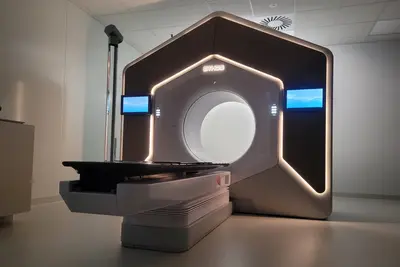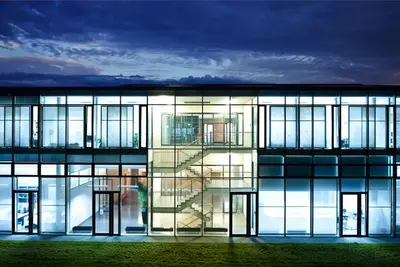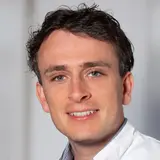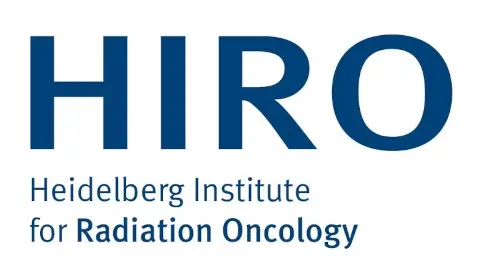Radiation Oncology
- Imaging and Radiooncology
- Clinical Cooperation Unit

Prof. Dr. Dr. Jürgen Debus
Head of Clinical Cooperation Unit
Our unit treats cancer patients with new innovative technologies and explores new strategies to adapt radiotherapy to the patients’ individual situation. This involves approaches from many fields, such as new imaging techniques, medical physics, computer sciences, biology and radiochemistry.
Image: ETHOS at DKFZ, © DKFZ

Image: ETHOS at DKFZ, © DKFZ
Our Research
In order to push the boundaries of modern radiation oncology we cooperate with many groups within the DKFZ, the University Hospital of Heidelberg and other national and international experts. Within the Heidelberg Institute of Radiation Oncology (HIRO) our goal is to provide for every patient the best available therapy option every day. Since 1997 the unit permanently investigates and optimizes ion therapy.
One current research focus is the treatment of moving tumors in the lung and upper abdomen. Breathing motion adjusted therapy is applied in so-called gated therapy; here, radiation is only delivered in the optimal breathing phase. To improve imaging of tumor motion necessary for gated or tracked therapy, we evaluate different markers placed invasively around the tumor. This includes gold markers for X-ray based fluoroscopy imaging and electromagnetic markers for online tumor motion tracking. Within the German Cancer Consortium (DKTK), molecular stratification of patients is investigated in a multicentric trial with the aim to identify markers to predict outcome after radiotherapy. We also perform analyses of the use of dual energy CT (DECT) with the aim of metal artefact correction, extraction of a virtual native CT and direct measurement of electron density. Evaluation of functional imaging in involving PET and MRI in the planning of radiotherapy is also on our agenda. This includes metabolic and hypoxic tracers and their potential to individualize radiation treatment of non-small cell lung cancer. Strong emphasis is put on the integration of MR imaging into image guided radiotherapy (IGRT). Using MR imaging and shuttle-based patient transport, we investigate the possibility to optimize adaptive radiotherapy by performing daily inter-fractional image guidance.
Projects

ETHOS at DKFZ in Heidelberg
The ETHOS Linear Accelerator (Varian, Palo Alto, CA, USA) at DKFZ in Heidelberg is a state-of-the-art radiation therapy device used for the treatment of various forms of cancer.

Ion Beam Therapy in Heidelberg
At the Heidelberg Ion Beam Therapy Center HIT, we offer high-precision treatment against cancer with heavy ion and proton therapy. At HIT, we irradiate selected cancers in adults as well as in children and adolescents in a highly effective manner.
MR-guided Radiotherapy in Heidelberg
The focus of this research group at Heidelberg University Hospital is on evaluating the potential of MR-guided adaptive radiotherapy. Hybrid devices, so-called MR-Linacs, combine a linear accelerator with a magnetic resonance tomograph, enabling direct MR imaging before and during radiation.
Team
Our team treats study patients with modern radiotherapeutic, radiological and nuclear medicine equipment.
-

Prof. Dr. Dr. Jürgen Debus
Head of Clinical Cooperation Unit
-

Priv. Doz. Dr. Fabian Weykamp
Deputy Head
-
Nicole Helker
Secretary
-
Annette Miltner
Head of RTTs
-
Alexandra Diwo
Patient Administration
Selected Publications
Kim JY, Tawk B, Knoll,M, Hoegen-Saßmannshausen P, Liermann J, Huber PE, Lifferth M, Lang C, Häring P, Gnirs R, Jäkel O, Schlemmer HP, Debus J, Hörner-Rieber J, Weykamp F.
Weykamp F, Meixner E, Arians N, Hoegen-Saßmannshausen P, Kim JY, Tawk B, Knoll M, Huber P, König L, Sander A, Mokry T, Meinzer C, Schlemmer HP, Jäkel O, Debus J, Hörner-Rieber J.
Tessonnier T, Ecker S, Besuglow J, Naumann J, Mein S, Longarino FK, Ellerbrock M, Ackermann B, Winter M, Brons S, Qubala A, Haberer T, Debus J, Jäkel O, Mairani A.
Arians N, Lindel K, Krisam J, Oelmann-Avendano JT, Meixner E, König L, Hoerner-Rieber J, Wark A, Forster T, Weykamp F, Lang K, Schneeweiss A, Ellerbrock M, Mielke T, Herfarth K, Debus J.
Heidelberg Institute for Radiation Oncology (HIRO)
Our clinical cooperation unit is member of the Heidelberg Institute for Radiation Oncology (HIRO).

Get in touch with us
